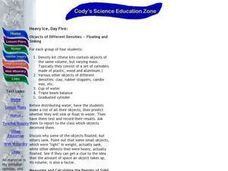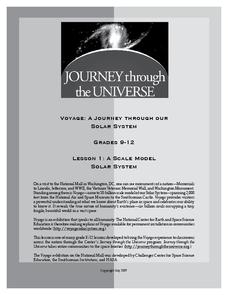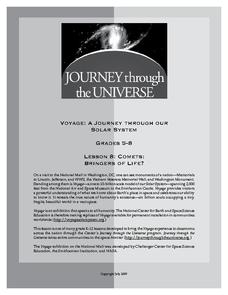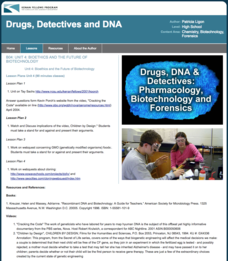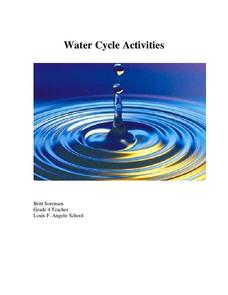Curated OER
Energetic Atoms - Active & Spaced Out
Students discover the power of the sun through an outdoor experiment. In this solar power lesson plan, students view a PowerPoint presentation on atoms before they complete an atom worksheet. Students utilize a solar bag to demonstrate...
Curated OER
Heavy Ice: Day Five
Students explore physics by conducting a class experiment. In this density lesson, students examine a list of items and discuss whether they will sink or float and then determine their density. Students examine the objects over five days...
Curated OER
Soil Water Worksheet #1
Drawings of four groups of soil particles of varying sizes are displayed across the page for soil scientists to examine. As they complete the worksheet, place a set of similar soils at each table for hands-on experience. In this way,...
Journey Through the Universe
A Scale Model Solar System
Between the time scientists discovered Pluto and reclassified it as a dwarf planet, it did not even make one full revolution around the sun. In two activities, scholars investigate scale models and their properties. Pupils find that it...
Journey Through the Universe
Comets: Bringers of Life?
Young scientists investigate the elements found in our solar system and then construct a model of a comet. They apply their new knowledge to the formation of the solar system.
Colorado State University
How Does the Earth Cool Itself Off?
Where does all the heat go when the sun goes down? An interesting lesson has learners explore this question by monitoring the infrared radiation emitted over time. They learn that hot spots cool more quickly that cooler spots.
University of Colorado
Can Photosynthesis Occur at Saturn?
In the 19th activity of 22, learners determine if distance from a light source affects photosynthesis. Participants capture oxygen in straws and find that the amount of water the gas displaces is proportional to the rate of photosynthesis.
NASA
Discovering the Milky Way
What do you call a tiny collection of galaxies? A puny-verse! Young scholars graph data gathered by scientists studying Cepheids. They attempt to identify a relationship between the variables through standard and logarithmical graphing....
Center for Learning in Action
Gases
Explore the properties of gases through one activity and two investigations in which super scientists observe the changes gas makes when encountering different conditions.
Laboratory for Atmospheric and Space Physics
Orbit Simulator
Researchers think they have evidence of a new planet deep in our solar system that is the size of Neptune and orbits the sun far beyond Pluto. The orbit simulator shows the orbits of our well-known planets, as well as Pluto and the comet...
Kenan Fellows
Unit 4: Bioethics and the Future of Biotechnology
What's the future of biotechnology? Explore a hot topic in the fourth and final unit in a series of Biotechnology lessons. Learners develop an understanding of the many issues in bioethics, then create an argument for or against the role...
Space Awareness
What is Time?
Does it ever seem like time is slipping through your fingers? Model the passing of time with an hourglass activity in which individuals determine whether hourglasses are the most efficient way to measure time.
Cornell University
Constructing and Visualizing Topographic Profiles
Militaries throughout history have used topography information to plan strategies, yet many pupils today don't understand it. Scholars use Legos and a contour gauge to understand how to construct and visualize topographic profiles. This...
BioEd Online
The Skeleton
Don't be chicken to try a lesson plan that compares the anatomy of birds to humans. Read the background information so you don't have to wing it when it comes to the anatomy of a chicken. Prepare cooked chicken bones by soaking them in a...
Earth Day Network
Healthy Earth, Sick Earth
Earth is sick and needs our help! Read the children's book Planet Earth Gets Well to explain the various problems facing the planet, discussing what young conservationists can do to heal the planet along the way. A great Earth Day...
Curated OER
Water Cycle Activities
Explore the water cycle in all aspects with a resource packed full of activities and lessons. The 37-page packet comes with vocabulary, a game, writing prompts, printables, and opportunities to journey through the stages in the water...
Michigan State University
In Search of Life
Explore the habitats around you with an activity that takes kids out of the classroom to learn about the local variety of habitats and the living things that call them home. In small groups, scholars investigate their surroundings,...
Curated OER
Macromolecule Lab
During a macromolecule lab, young chemists perform multiple tests, including iodine starch tests, to determine if eight mystery foods contain lipids, sugars, or starches.
Glynn County School System
Earth's Magnetic Field and the Moon
The surface of the moon has an amazing tale to tell. Learn about the moon's story with a PowerPoint presentation that describes the unique features of the moon's surface as well as explains its movement in relation to Earth.
Biology Junction
Dissection of the Clam
Is the structure of a clam really as simple as it seems? Young scholars explore the anatomy of the clam in an engaging lesson presentation. The lesson highlights the digestive process of the clam as well as how it moves and what it does...
Curated OER
Experiment: Faster Air = Lower Air Pressure 2
Students experiment to observe air current and pressure.
Curated OER
Fine Motor Skills
Fourth graders discuss what they know about the planets, space, and the solar system including the colors of the planets. They also talk about why the planets are the color that they are. Next, they color cut-outs of the planets using...
Curated OER
Properties of Dust
Students examine the dust in their classroom and relate it to the dust in space. In this investigative lesson plan students collect dust and graph their findings.
Curated OER
NASA Robots
Students investigate how robots are used in space. In this space science lesson, students participate in an experiment using a blindfold and complete assigned tasks. The students demonstrate how robots are "thinking" machines.



